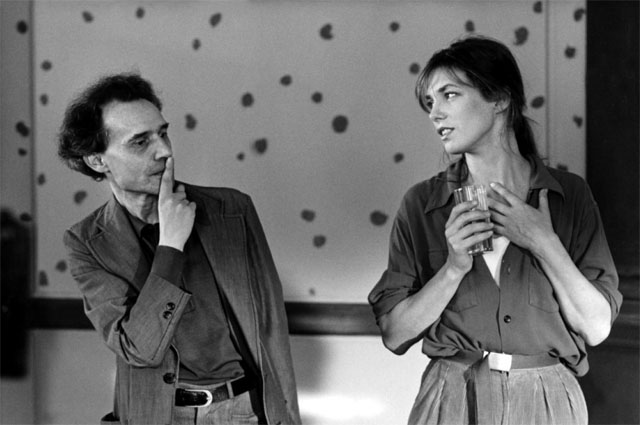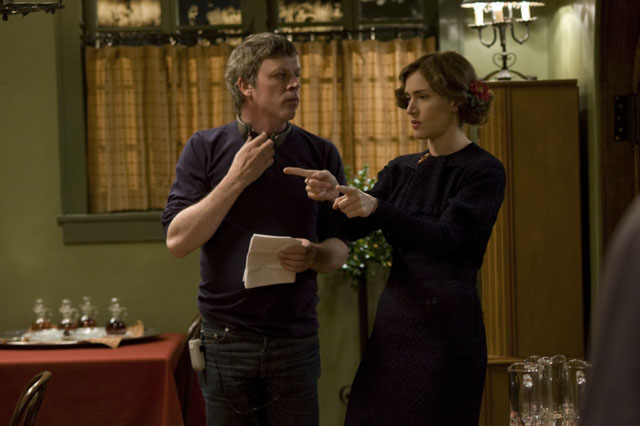A few days ago, Ted Fendt gave us his translation of Alain Bergala and Alain Philippon’s detailed report for the October 1984 issue of Cahiers du cinéma on the methods by which Eric Rohmer went about shooting Full Moon in Paris (Les Nuits de la pleine lune), a follow-up to his translations from that same issue of an interview with Jean-Marie Straub and Danièle Huillet and Bergala’s report on the making of their Class Relations (Klassenverhältnisse), both of which ran at Kino Slang last summer.
Today, he’s running his latest translation from that issue, Marc Chevrie’s detailed account of Jacques Rivette and his collaborators setting into motion the project that would become Love on the Ground (L’amour par terre): “As [Pascal] Bonitzer says, ‘A jazz musician isn’t asked to write a partition, Jackson Pollack isn’t asked to do a rough sketch.'”
More reading. In the Guardian, J. Hoberman sketches a brief history of how Hollywood’s dealt with 9/11 these past ten and a half years before turning to the film that looks set to conquer another weekend: “The Avengers, which last week enjoyed the biggest North American opening in history, recasts 9/11 in the Bush years’ dominant movie mode, namely the comic book superhero spectacular—albeit with a heavy dose of irony and added stereoscopic depth. But more fundamentally, The Avengers demonstrates how completely 9/11 has been superseded by another catastrophe, namely the financial meltdown of September 2008. To the extent that the movie has any sort of social content (or any content), it offers a flattering view of America’s best as a group of eccentric individualists bamboozled into saving the world (economy) by the unflappable Samuel L. Jackson’s black dude of mystery. But even this Obama-iste reading is a bit of a stretch.”
Cannes. For the New York Times, Dennis Lim talks with Wes Anderson about Moonrise Kingdom, the film that’ll be opening the festival on Wednesday: “This is the only time I’ve been consciously trying to capture a sensation, which is that emotion of when you’re a 12-year-old and you fall in love.”
New York. “Todd Haynes has always been particularly brilliant at the succinct gesture,” writes Michael Koresky in Reverse Shot. “Poison (1992) and I’m Not There (2007) jump between multiple story strands with finesse, each given just enough screen time to make visual impact; Safe (1995), widely regarded as his masterpiece, plays like a series of loaded moments, each scene precise and unsettling and never giving too much information, as impenetrable as its ambiguously ill protagonist; Far from Heaven (2002) unfolds as a series of discrete fifties-era Hollywood tableaux that build to a single emotional crescendo. For his 2011 made-for-HBO miniseries Mildred Pierce—an adaptation more faithful to James M. Cain’s 1941 novel than the famous Michael Curtiz version from 1945 that earned Joan Crawford her Oscar—he stretches his talents out to five and a half hours; the breathing room brings out something new, strange, and wondrous in him. This is an expansive, rich psychological portrait first, and a detailed pastiche second.” And it’s screening tomorrow at the Museum of the Moving Image.
Los Angeles. As it happens, Poison is screening tonight at the Billy Wilder Theater as part of the series NQC @ 20: Revisiting New Queer Cinema. Also tonight, but at the Echo Park Film Center: Moving Pictures: Painting, Photography, Film, with work by the likes of John Baldessari, Paul McCarthy, Sam Erenberg, Morgan Fisher, Gary Beydler, and more.
DVD/Blu-ray. “Some rate Orson Welles’s 1965 Shakespeare compression/adaptation Chimes at Midnight as a) the greatest Shakespeare film ever, or at least close, and/or b) one of Welles’s greatest cinematic achievements period.” Glenn Kenny offers a guide to three releases on DVD: “We begin with bad news, and end with pretty good news.”
“One of the greatest first films in all of American cinema, Being John Malkovich (1999) introduced audiences to Spike Jonze and Charlie Kaufman, two of the most distinctive voices in contemporary movies,” writes Dennis Lim for the Los Angeles Times. “A mad scramble of surrealist tropes and philosophical ideas, it marked the acme of Hollywood’s passing interest in existentialist postmodernism, which manifested itself through the ’90s in such meta-movies as Groundhog Day, The Truman Show and The Matrix. Thirteen years on, Being John Malkovich—which the Criterion Collection is releasing on DVD and Blu-ray this week—has lost none of its lunatic charm.” And Criterion Corner notes that “someone at Criterion got the brilliant idea of getting Spike Jonze’s close friend / arch-nemesis Michel Gondry to record the commentary track.” CC presents the five best quotes (and they are good).
This week in the NYT, Dave Kehr reviews Universal‘s new release of the 1959 Doris Day and Rock Hudson comedy Pillow Talk, which “remains a richly suggestive combination of old and new: one of those films that seems to move the conversation forward while clinging in many ways to the past,” and Kino Lorber‘s edition of Jack Cardiff’s “Eurotrash oddity” Girl on a Motorcycle (1968) with Marianne Faithfull and Alain Delon.
In the works. David Cairns is now working on a documentary about “that shadowy and exotic figure of film history, Bernard Natan—producer in France in the late twenties and early thirties, head of Pathe, and eventually convicted of fraud, slandered as a pornographer, sentenced to jail and finally handed over to the Nazis.”
Jen Vineyard recently spoke with Lisa Cholodenko and confirms that the director of The Kids Are All Right will be “taking over the adaptation of Tom Perrotta’s book The Abstinence Teacher, which at one point was to be directed by Little Miss Sunshine team Valerie Faris and Jonathan Dayton,” and that Reese Witherspoon is “slated to produce and star in one of Cholodenko’s other new projects, an adaptation of Cheryl Strayed’s memoir of her 1,100-mile solo hike in the wake of personal tragedy, Wild: Lost and Found on the Pacific Crest Trail.”
Deadline‘s Mike Fleming reports that Alec Baldwin will be “reuniting with his To Rome With Love helmer Woody Allen, and his Rock of Ages co-star Russell Brand.”
In other news. At the Playlist, Edward Davis reports that William Friedkin is suing Paramount and Universal Pictures, the the domestic and international distributors of Sorcerer (1977), “alleging that neither party delivered a profit-participation statement or accounting regarding the film in more than 20 years. But the main issue is that Friedkin just wants to screen the damn film and hopefully bring it back to DVD (we’d kill for a fancy deluxe director’s cut, frankly). But one of the main problems: neither company seems to know who owns the rights to the movie.”
Obit. Günther Kaufmann, best known for his work with Rainer Werner Fassbinder—they were lovers for a time and made 14 films together—died of a heart attack Thursday evening while walking through a park in Berlin, reports Spiegel Online. Kaufmann’s life was quite a story, succinctly outlined at Wikipedia.
For news and tips throughout the day every day, follow @KeyframeDaily on Twitter and/or the RSS feed.






